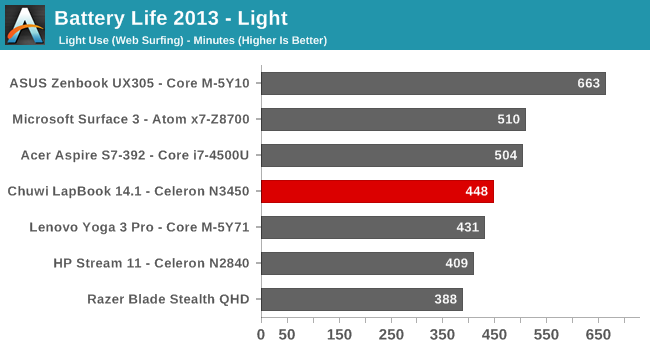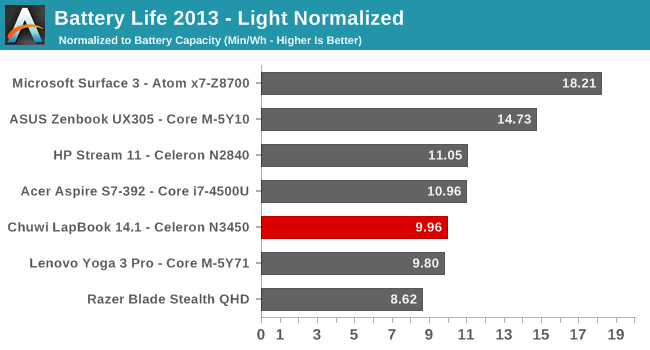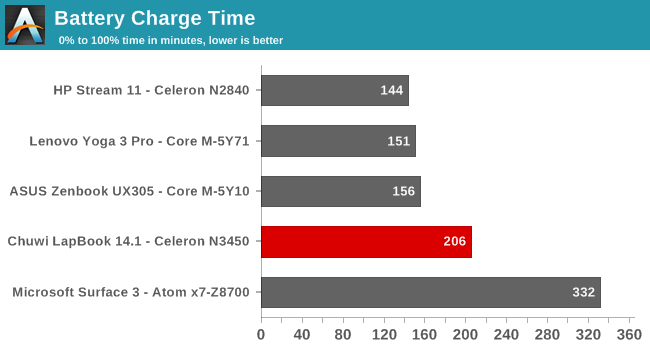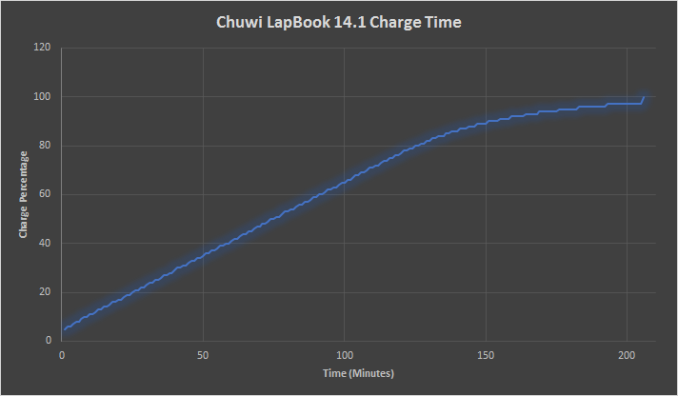The Chuwi LapBook 14.1 Review: Redefining Affordable
by Brett Howse on March 10, 2017 8:00 AM ESTBattery Life
With a 6-Watt Celeron branded processor, featuring the latest generation Atom CPU core, and a 45-Wh battery, the Chuwi Lapbook 14.1 has the capability of offering some great battery life, but the devil is always in the details, and there’s more to battery life than just the CPU. Let’s take a look.
2013 Light Web Browsing

All our battery life testing is done at 200 nits, which on the Chuwi means the display is almost at 100% brightness. This is certainly a contributing factor to dragging down the battery life somewhat. I was expecting over ten hours on this test, and the Chuwi fell well short of that. It’s a respectable 7.5 hours, but for an Atom powered laptop with a decent size battery, it really should have done more.
2016 Web Browsing

The newer battery life test is much more demanding of the CPU, and it really shows. The extra workload drops the battery life down to 6.25 hours, and it’s really a long way from where this laptop should be. When a laptop manufacturer really strives for battery life, every component needs to be looked at and evaluated, and at this price point, that’s likely not a realistic scenario. It’s still a decent result, but it should be higher.
Normalized


By removing the battery size from the equation, we can see just how efficient the overall platform is. Here you can really see how much the Chuwi is lacking compared to more premium devices. The now discontinued Microsoft Surface 3, with quad-core previous generation Atom, is basically double the efficiency of the Chuwi, and most recent Ultrabooks are well over it as well. Some work here by Chuwi could go a long way on the end user experience with their product.
Movie Playback


The movie playback test splits the difference between the web browsing tests, and our Tesseract score lets you know you can almost watch The Avengers three times before having the machine turn off. This isn't as good as hoped.
Charge Time
The laptop ships with a 24-Watt AC Adapter, which is 100V-240V. The review unit shipped with the wrong cable, but since it’s a standard PC cable, it wasn’t difficult to dig up the proper North American plug, which is no issue because the adapter itself handles both voltages.

The charging capabilities of the Chuwi are about the opposite of the battery life. With just 24 Watts, it takes about 3.25 hours to charge from 5% to 100%, which is quite a long time for a 45 Wh battery. So, the result is the battery life is less than expected, and the charging time is longer than expected. That’s not exactly a great combination, but when you want to hit a price point, sometimes things have to be sacrificed.











75 Comments
View All Comments
BrokenCrayons - Friday, March 10, 2017 - link
Here's a link to a reviewer that tested the Lapbook with Ubuntu:http://www.cnx-software.com/2017/02/07/installing-...
The results look promising.
tipoo - Friday, March 10, 2017 - link
If I could don my tin hat for only a few seconds...Has anyone ever looked at the outbound traffic on these lesser known Chinese designed electronics? There was some controversy with Xiaomi router traffic even iirc.
BrokenCrayons - Friday, March 10, 2017 - link
A quick search didn't turn up anything. I don't think they're selling in large enough numbers to attract a lot of interest in sniffing their outbound traffic. It's a reasonable concern, but I don't think Chuwi would actively attempt to perform mass data collection. That's a pretty widely cast net that wouldn't reap much value because you're probably looking at largely home users. The data collection would be almost entirely uninteresting. Maybe some social networking, shopping and general web browsing, someone's hidden inappropriate photos and videos...that kind of thing isn't worth a lot unless you have a specific target in mind and in that case its more prudent to isolate that individual rather than everyone buying your products. Probably the best you'd get is access to someone's personal finances and a deep enough investigation would do a lot of damage to business interests. It's really worth more to establish a good brand reputation and land decent numbers of sales than it is to go through the trouble of getting one or two generations of hardware out there to a small number of people that probably are collectively deep in debt and have little liquid cash.fanofanand - Monday, March 13, 2017 - link
I think the concern would lay more on the government's involvement (The Chinese government is involved with virtually all exported electronics). I agree with every single thing you wrote, but Chinese businesses don't all exist for the sole purpose of making money.Bullwinkle J Moose - Friday, March 10, 2017 - link
Good point tipooThis article just today and all the turmoil at Samsung and S Korea makes me think we should be looking out for malware popping up in other places
Even places we have considered to be quite reliable up till now
https://arstechnica.com/security/2017/03/preinstal...
Things seem to be escalating but I'm sure the CIA will put a start to any malware threats to this Country (LOL)
Murloc - Saturday, March 11, 2017 - link
to make such low costs devices you buy standard chips so I don't think they can put anything in it.If chinese-designed chips have espionage software in them, then a bunch of the network infrastructure we rely on is bugged because huawei is everywhere in them. Also phones that use mediatek devices.
So worrying doesn't make sense, also because it's well-known from the various leaks and stuxnet that the NSA and the CIA and mossad don't need hardware to snoop or damage critical infrastructure so the chinese don't either.
Meteor2 - Friday, March 10, 2017 - link
Nice review of a nice machine.Good to read about how Goldmont finally played out. MS must've been pissed when Intel cancelled Broxton, but I imagine it's now Intel's turn with Windows on 835 coming. It's a shame Intel did what they did as Goldmont appears to be good silicon.
aryonoco - Friday, March 10, 2017 - link
The main competition in this price category is Chromebooks.The fact that you are pitting this device in your comparisons against a Yoga 3 Pro and a Asus UX305, and not a single Chromebook, says all that needs to be said about the sorry state of AT these days.
Sure, I miss Anand & Brian, but when they left we got Jarred Walton Andrei Frumusanu, who at least knew what they were talking about. Ryan, these new writers you have hired do not stack up.
Ian Cutress - Saturday, March 11, 2017 - link
To clarify an obvious error: Jarred was here 10 years, and both Andrei and Brett were here well before Anand left. Brett has been one of our freelance editors for over two years and attends events such as CES and Build as our Senior Laptop Editor. If you dislike the context of this review, sure, I'll grant you that opinion, but he has a large body of great work under him already. He's not new, he knows the score.On the testing front, it's a factor of what we get in for testing at any given time. Ultimately 90% of the time vendors want us to test their premium units, not something low cost. And there's a thousand low-cost options out there to potentially compare them against. When you've got a freelancer with time for 6-10 reviews a year, most of those will be high-end premium reviews. So if something interesting comes along, even at a super low price point, you compare against what you can or have at the time.
Which in this case, the HP Stream 11 is the perfect comparison point for all these benchmarks. The Yoga/Surface are added to show the comparison to what a high-end notebook investment would be, which users always want to know without having to dig through our results database. We do have some Chromebooks in our database, but they are old. We haven't tested one in a long while (so we don't have one in for retesting), and they were all done by a different reviewer over 1000 miles away at the time. Most of the Chromebooks are Atom based anyway, which is why the HP Stream is still a relevant comparison. Heck, I even recommended the Stream 11 to someone I know a couple of weeks ago, and she loves it (especially now there's a 360-degree hinge version).
fanofanand - Monday, March 13, 2017 - link
I get what the OP is saying but it is misguided in this case. Brett's reviews are solid. Some of the review product choices (case and PSU reviews) have been questionable but other than mobile reviews I haven't seen a real decline in the quality of Anandtech's journalism. Yes, they have had some major misses in the last year (especially in the GPU space) but what they have actually written has been fairly solid content.